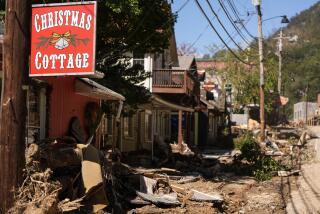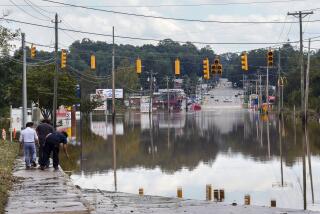Sheriff says rescuers ‘will not rest’ as search for Helene’s victims drags into second week

- With at least 215 killed, Helene is the deadliest hurricane to hit the mainland U.S. since Katrina in 2005, and dozens or possibly hundreds of people are still unaccounted for.
- Exhausted rescue crews and volunteers navigate past washed-out roads, downed power lines and mudslides to reach the isolated and the missing.
The search for victims of Hurricane Helene dragged into its second week on Friday, as exhausted rescue crews and volunteers navigated past washed-out roads, downed power lines and mudslides — to reach the isolated and the missing.
“We know these are hard times, but please know we’re coming,” Sheriff Quentin Miller of Buncombe County, N.C., said at a Thursday evening news briefing. “We’re coming to get you.”
With at least 215 killed, Helene is the deadliest hurricane to hit the mainland U.S. since Katrina in 2005, and dozens or possibly hundreds of people are still unaccounted for.
Roughly half the victims were in North Carolina, while dozens more were killed in South Carolina and Georgia.
In Buncombe County, 72 people had been confirmed dead as of Thursday evening, Miller said. Buncombe includes the tourist hub of Asheville, the region’s most populous city. Still, the sheriff holds out hope that many of the missing are alive. “We will not rest until you are secure,” he said.
Rescuers face difficult terrain
It has been more than a week since the storm came ashore on Florida’s Gulf Coast, but phone service and electricity outages mean search crews must trudge through the mountains to learn whether residents are safe.
Along the Cane River in western North Carolina’s Blue Ridge Mountains, the Pensacola Volunteer Fire Department had to cut their way through trees at the top of a valley on Thursday, nearly a week after a wall of water swept through.
Near the Tennessee state line, crews were finally starting to reach side roads after clearing the main roads winding through switchbacks, but that brought a new set of challenges.
“Everything is fine and then they come around a bend and the road is gone and it’s one big gully or the bridge is gone,” said Charlie Wallin, a Watauga County commissioner. “We can only get so far.”
Every day there are new requests to check on someone who hasn’t been heard from, Wallin said.
When the search will end is hard to tell.
“You hope you’re getting closer, but it’s still hard to know,” he said.
Lives lost across the Southeast
In Florida, a dozen people died in the Tampa Bay area, with the worst damage on the narrow, 20-mile string of barrier islands that stretch from St. Petersburg to Clearwater.
“The water, it just came so fast,” said Dave Behringer, who ignored evacuation orders and rode out the storm in his home after telling his wife to flee. “Even if you wanted to leave, there was no getting out.”
Power slowly coming back
The number of homes and businesses without power has dipped below1 million, according to poweroutage.us. Most of the outages are in the Carolinas and Georgia, where Helene struck after coming into Florida on Sept. 26 as a Category 4 hurricane.
President Biden flew over the devastation in North and South Carolina this week. Vice President Kamala Harris handed out meals, embraced a shaken family and surveyed destruction in Georgia, also pledging federal help.
The administration announced a federal commitment to pay for debris removal and emergency measures for six months in North Carolina and three months in Georgia.
Amy writes for the Associated Press. Contributing to this report were Associated Press journalists Jeffrey Collins in Columbia, S.C.; Darlene Superville in Keaton Beach, Fla.; John Seewer in Toledo, Ohio; Michael Kunzelman in College Park, Md.; Hannah Fingerhut in Des Moines and Hannah Schoenbaum in Salt Lake City.
More to Read
Sign up for Essential California
The most important California stories and recommendations in your inbox every morning.
You may occasionally receive promotional content from the Los Angeles Times.










